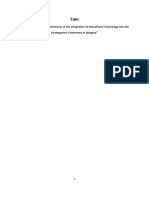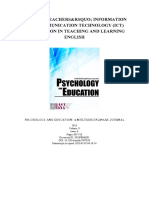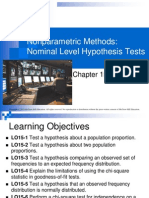RRL I
RRL I
Uploaded by
xyleaesthrellaCopyright:
Available Formats
RRL I
RRL I
Uploaded by
xyleaesthrellaCopyright
Available Formats
Share this document
Did you find this document useful?
Is this content inappropriate?
Copyright:
Available Formats
RRL I
RRL I
Uploaded by
xyleaesthrellaCopyright:
Available Formats
Technology nowadows helped many people shape their everyday doings.
And
so, the school also emphasizes the same. The process of integrating
standards into the curriculum should emphasize learning and growth for all
as the natural and desired outcome of reform in the schools. From that
perspective, a standards-based curriculum includes not only goals,
objectives, and standards, but everything that is done to enable attainment
of those outcomes and, at the same time, foster reflection and revision of the
curriculum to ensure students’ continued growth (Pattinson & Berkas, 2000).
According to Tembrevilla (2020) in her study "Examining ICT and FoK
Integration in rural public junior high schools with the Philippines’ new K-12
curriculum” This study contributes in understanding of teaching technology
in ICT and FoK in rural public high schools. Moreover, it underscores areas for
consideration in developing countries with similar circumstances such as the
Philippines regarding: centering ICT investments on teachers and teaching;
clarifying ICT policies’ terms of implementation, noting that different
definitions lead to different policy investments and recommendations;
introducing video-creation as a professional development program for
teachers in rural public schools; and recognizing rural public schools and
their teachers as places and people of innovation and alternatives of
pedagogical effectiveness.
Information and Communications Technology (ICT) provides access to
information through telecommunication technologies to interact in the digital
world (Aktürk, 2020; Aktürk & Delen, 2020; Alharthi, 2020; Pratt, 2020). ICT
continues to evolve to bring remarkable changes in the country’s educational
system. Buabeng-Andoh (2012) emphasized that to successfully utilize
technology in educational reforms teachers must have strong support and
attitude towards the integration of ICT in education. In the 21 st
century,“technology” has a significant role in various fields that include
education considering that it becomes an information super-highway
worldwide. Innovation is essential in integrating technology in education for
it can transform the way people think, work, and live (Ghavifekr et al., 2014).
The Influence of ICT in developing ways on how to better deliver instruction
has been regarded as beneficial in education. In language teaching, the use
of ICT is an impactful experience. Rosa (2016). Based on the study
conducted by (Jimoyiannis & Komis, 2020). The survey presented in this
article examines current teachers’ beliefs and attitudes towards information
and communication technologies (ICT) in education. They found that
personal factors (subject matter, teaching experience and gender) are
strongly associated with the beliefs and perceptions teachers hold about ICT
in education.
You might also like
- Teachers' Attitudes Towards The Use of ICTDocument10 pagesTeachers' Attitudes Towards The Use of ICTRizky Allivia LarasatiNo ratings yet
- Three Steps To HLURB RegistrationDocument2 pagesThree Steps To HLURB RegistrationRicky Sabornay100% (1)
- The Effectiveness of Deped Computerization PackageDocument28 pagesThe Effectiveness of Deped Computerization PackageJosenia Constantino100% (11)
- Lecture For Ped 102Document27 pagesLecture For Ped 102ahaddinmahfuzNo ratings yet
- ICT CompetencyDocument18 pagesICT Competencylouiege banasNo ratings yet
- Chapter 1 AjDocument15 pagesChapter 1 AjAjay JumagdaoNo ratings yet
- ICT Integration (!0 Pages RRL - Methodology)Document15 pagesICT Integration (!0 Pages RRL - Methodology)Jerven BregañoNo ratings yet
- Assessing The Impact of ICT in TeachingDocument50 pagesAssessing The Impact of ICT in TeachingEric AmankwaNo ratings yet
- ICTDocument25 pagesICTKent De guzmanNo ratings yet
- Final Thesis - ElaineDocument71 pagesFinal Thesis - ElaineNikole Artugue50% (2)
- CHAPTER-1Document15 pagesCHAPTER-1Chand Kris MejicaNo ratings yet
- Chapter 1 (4-30-2023)Document17 pagesChapter 1 (4-30-2023)JessNo ratings yet
- Edict 2018 2502Document16 pagesEdict 2018 2502bapropskNo ratings yet
- Researcch of Stress - Chap-1-3Document27 pagesResearcch of Stress - Chap-1-3ethan antonesNo ratings yet
- ACTION RESEACRH Group10 (Inferential Statistics)Document103 pagesACTION RESEACRH Group10 (Inferential Statistics)fordmay96No ratings yet
- Research Into ICT Integration in Pakistan Secondaaary SchoolsDocument11 pagesResearch Into ICT Integration in Pakistan Secondaaary SchoolsKeshawn PaulNo ratings yet
- Scholarly Research Journal'sDocument13 pagesScholarly Research Journal'sAnonymous CwJeBCAXpNo ratings yet
- IRJVol12 64 77Document14 pagesIRJVol12 64 77Myer Reign MendozaNo ratings yet
- Febri Wiranda (22216251099)Document4 pagesFebri Wiranda (22216251099)Nita Maghfiratul Jannah, S.Pd. 21510910730594No ratings yet
- Conceptual Model To Predict Filipino Teachers 2Document16 pagesConceptual Model To Predict Filipino Teachers 2Lukwago UmaruNo ratings yet
- Presented by Jamila Khattak: Research ProposalDocument14 pagesPresented by Jamila Khattak: Research ProposalRabbiyaa EjazNo ratings yet
- ICT Integration in ClassroomDocument21 pagesICT Integration in ClassroomMICHAEL LOUI SULITNo ratings yet
- Perception of Teachers' Towards Extensive Utilization of Information and Communication TechnologyDocument13 pagesPerception of Teachers' Towards Extensive Utilization of Information and Communication TechnologyJenny TiaNo ratings yet
- Case Study - Integration of ICT in Teaching and Learning in SchoolDocument3 pagesCase Study - Integration of ICT in Teaching and Learning in SchoolHuiwen ChiaNo ratings yet
- Research title-WPS OfficeDocument3 pagesResearch title-WPS OfficejohnsonllaneraNo ratings yet
- Instructional DesignDocument46 pagesInstructional DesignOctavius GuNo ratings yet
- JSS Vol11 No2 2021 The Use of Information and Communication Technology ICT As An Educational Tool To Improve Learning and Teaching SkillsDocument11 pagesJSS Vol11 No2 2021 The Use of Information and Communication Technology ICT As An Educational Tool To Improve Learning and Teaching Skillsbriandequito01No ratings yet
- MODULE 2-TTL1_AVDF_Document10 pagesMODULE 2-TTL1_AVDF_Geraldine QuesadaNo ratings yet
- Chapter 2 (4-30-2023)Document13 pagesChapter 2 (4-30-2023)JessNo ratings yet
- The Role and Importance of Information and Communication Technology in The Management of Professional Educational Institutions in IndiaDocument8 pagesThe Role and Importance of Information and Communication Technology in The Management of Professional Educational Institutions in Indiabmerf indiaNo ratings yet
- Information and Communication Technology (ICT) Knowledge, Skills, and Attitude Basis For DEPED Support SystemDocument13 pagesInformation and Communication Technology (ICT) Knowledge, Skills, and Attitude Basis For DEPED Support SystemPsychology and Education: A Multidisciplinary JournalNo ratings yet
- Action Research Proposal Technology Supported Inquiry Based Learning For Improved Students Learning Outcomes and Engagement Among Grade 7 StudentsDocument23 pagesAction Research Proposal Technology Supported Inquiry Based Learning For Improved Students Learning Outcomes and Engagement Among Grade 7 StudentsNAOME FRANCISCONo ratings yet
- Assessing The Proficiency Level in Digital Competences of SecondaryDocument18 pagesAssessing The Proficiency Level in Digital Competences of SecondaryConstanza J. Cabaña AlvearNo ratings yet
- Chapter IiDocument12 pagesChapter IiYvetteNo ratings yet
- Research ProposalDocument14 pagesResearch ProposalNabilahNo ratings yet
- Information and Communications Technology (ICT) Integration and Challenges in The Chuzagang Primary School in Sarpang.Document8 pagesInformation and Communications Technology (ICT) Integration and Challenges in The Chuzagang Primary School in Sarpang.AJHSSR JournalNo ratings yet
- Studies in Educational Evaluation: Yajing Wang, Yashuang WangDocument13 pagesStudies in Educational Evaluation: Yajing Wang, Yashuang WangNóra SzécsiNo ratings yet
- Probing Ict Competency of Student-Teachers in Region 10: Basis For Software Input DevelopmentDocument21 pagesProbing Ict Competency of Student-Teachers in Region 10: Basis For Software Input DevelopmentJojames GaddiNo ratings yet
- ETICTDocument12 pagesETICTAlvarez HazelNo ratings yet
- RRL FinalsDocument6 pagesRRL FinalsJohn SesconNo ratings yet
- Zhang Rui Chapter 1 To 3 (4AUGUST)Document57 pagesZhang Rui Chapter 1 To 3 (4AUGUST)yany kamalNo ratings yet
- Impact of Digital Technologies Upon Teaching and Learning in Higher Education in Latin America: An Outlook On The Reach, Barriers, and BottlenecksDocument70 pagesImpact of Digital Technologies Upon Teaching and Learning in Higher Education in Latin America: An Outlook On The Reach, Barriers, and Bottlenecksjoylorenzo84No ratings yet
- DIGI RISE DEXTERITY Reseach Chapter 1 1Document17 pagesDIGI RISE DEXTERITY Reseach Chapter 1 1argie joy marieNo ratings yet
- Revise ICT Proposal 2.3Document25 pagesRevise ICT Proposal 2.3Noel Delos AngelesNo ratings yet
- Chapter-2REVIEW-OF-RELATED-LITERATURE-AND-STUDIESDocument20 pagesChapter-2REVIEW-OF-RELATED-LITERATURE-AND-STUDIESConcepcion AncajasNo ratings yet
- An Assessment To Teacher'S Ict Integration in The Curriculum in Diffun District 02Document32 pagesAn Assessment To Teacher'S Ict Integration in The Curriculum in Diffun District 02Krisna Criselda SimbreNo ratings yet
- Level of Teachers' Information and Communication Technology (ICT) Integration in Teaching and Learning EnglishDocument17 pagesLevel of Teachers' Information and Communication Technology (ICT) Integration in Teaching and Learning EnglishPsychology and Education: A Multidisciplinary JournalNo ratings yet
- 30 Trishala BhaskarDocument7 pages30 Trishala BhaskarAnonymous CwJeBCAXpNo ratings yet
- Technology and Teacher EducationDocument18 pagesTechnology and Teacher Educationaldaneji100% (1)
- 3 PBDocument8 pages3 PBalfrialjasalNo ratings yet
- Assessing The Impact of Information Communication Technology ICT in The Teaching and Learning of Social Studies in Senior High Schools in Ghana A Case of Eastern Region SchoolsDocument25 pagesAssessing The Impact of Information Communication Technology ICT in The Teaching and Learning of Social Studies in Senior High Schools in Ghana A Case of Eastern Region SchoolsEditor IJTSRDNo ratings yet
- Ed 215 - Lesson 3Document4 pagesEd 215 - Lesson 3JonisaNo ratings yet
- Literature ReviewDocument10 pagesLiterature ReviewOanh Vũ ThịNo ratings yet
- (Gideon) ICT APPLICATION AND ITS USE IN BUSINESS EDUCATION COURSES FOR TEACHING AND LEARNINGDocument56 pages(Gideon) ICT APPLICATION AND ITS USE IN BUSINESS EDUCATION COURSES FOR TEACHING AND LEARNINGgreatbachelintNo ratings yet
- Lecture 2. ICT Policy Tools Concepts PDFDocument11 pagesLecture 2. ICT Policy Tools Concepts PDFNoli ResterioNo ratings yet
- Teachers' Perception On Acceptance and Benefits of Integrating ICT in Teaching in Senior Secondary Schools in Mangu LGA, Plateau State, Nigeria-2Document11 pagesTeachers' Perception On Acceptance and Benefits of Integrating ICT in Teaching in Senior Secondary Schools in Mangu LGA, Plateau State, Nigeria-2vdomshakNo ratings yet
- Chapter 1-3 SM EditedDocument31 pagesChapter 1-3 SM EditedRaima Macapundag CabaroNo ratings yet
- Thesis Ni Mam JesselDocument15 pagesThesis Ni Mam JesselNylram Sentoymontomo AiromlavNo ratings yet
- Term PaperDocument6 pagesTerm PaperSeng SokungNo ratings yet
- Design and Technology: Thinking While Doing and Doing While Thinking!From EverandDesign and Technology: Thinking While Doing and Doing While Thinking!No ratings yet
- Figure 1: Alcohols Used To Produce Rosin EstersDocument1 pageFigure 1: Alcohols Used To Produce Rosin Estersabhishek.mishrajiNo ratings yet
- Immediate Download International Financial Statement Analysis (CFA Institute Investment Series Book 119) 4th Thomas R. Robinson All ChaptersDocument24 pagesImmediate Download International Financial Statement Analysis (CFA Institute Investment Series Book 119) 4th Thomas R. Robinson All Chaptersmojibtmng100% (1)
- The Boeing Company Ratio Analysis: Prepared byDocument10 pagesThe Boeing Company Ratio Analysis: Prepared byMozammel AhmedNo ratings yet
- Statistical TechniquesDocument41 pagesStatistical TechniquesAnindito W WicaksonoNo ratings yet
- LogDocument6 pagesLogtrivo02032012No ratings yet
- Lumileds Demo LED Bulbs and Modules LeafletDocument2 pagesLumileds Demo LED Bulbs and Modules LeafletAkbar ZuhriNo ratings yet
- Porous Polymer MPC 3110/3210: Technical Data SheetDocument1 pagePorous Polymer MPC 3110/3210: Technical Data Sheetmanishsingh811No ratings yet
- 8065_21122024123835_unlockedDocument12 pages8065_21122024123835_unlockedtrandingvideo952No ratings yet
- Efpia White-Paper Public-ProcurementDocument18 pagesEfpia White-Paper Public-ProcurementKaryofyllis TsiakitzisNo ratings yet
- Cybro Hardware Manual v3.20Document65 pagesCybro Hardware Manual v3.20Antonio KovacevicNo ratings yet
- Commandants Paper Final AyubDocument106 pagesCommandants Paper Final Ayubiwang saudjiNo ratings yet
- Podman Within WSL2 - enDocument32 pagesPodman Within WSL2 - ensoundarya269518No ratings yet
- Trade Test Class 1Document7 pagesTrade Test Class 1Godfrey Masumbika100% (1)
- Uae SST Finals DocumentDocument10 pagesUae SST Finals DocumentprateekshadharaniNo ratings yet
- History Copy RightDocument13 pagesHistory Copy RightClaudine ArrabisNo ratings yet
- Lexmark ms310 User GuideDocument110 pagesLexmark ms310 User Guidesmang10No ratings yet
- Mechatronics Handbook 2009Document45 pagesMechatronics Handbook 2009Lam Chun YienNo ratings yet
- Kebutuhan Air Bersih Kabupaten Seruyan OkDocument13 pagesKebutuhan Air Bersih Kabupaten Seruyan OkLilis IndrianiNo ratings yet
- CoE Ltr 20241024 RDSO wrt to E-70 and CCB 2.0 Interfacing kabajDocument11 pagesCoE Ltr 20241024 RDSO wrt to E-70 and CCB 2.0 Interfacing kabajnahamed248No ratings yet
- Hybrid Equivalent For CB TransistorDocument5 pagesHybrid Equivalent For CB TransistorAANo ratings yet
- Antischiuma - L808e - MSDSDocument9 pagesAntischiuma - L808e - MSDSMohamed HalemNo ratings yet
- Thesis AllowanceDocument5 pagesThesis Allowancednqjxbz2100% (2)
- Practical Research 2 First Quarter ExamDocument4 pagesPractical Research 2 First Quarter Examwencylle casilNo ratings yet
- Cap BudgetingDocument24 pagesCap Budgetingcrazy23No ratings yet
- Overview of GSM Cellular Network and OperationsDocument90 pagesOverview of GSM Cellular Network and OperationsscribdmithunNo ratings yet
- PteTCons2020 PrintAlotLetter - PHP#Document7 pagesPteTCons2020 PrintAlotLetter - PHP#MODICARE , Be your own bossNo ratings yet
- Bacti Cinerator Sterilizer Hy 800Document6 pagesBacti Cinerator Sterilizer Hy 800juan cometaNo ratings yet
- Are Wind Turbine Step Up Transformers The Weak Link in The Wind Energy Supply ChainDocument3 pagesAre Wind Turbine Step Up Transformers The Weak Link in The Wind Energy Supply ChainpctinformationNo ratings yet
- Vouching and VerificationDocument26 pagesVouching and VerificationmfranciskishushuNo ratings yet

























































































